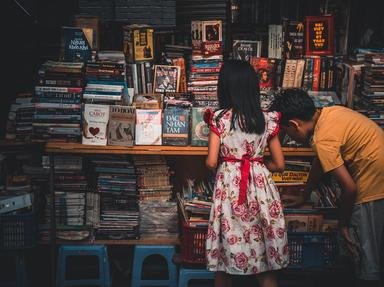Quiz Answer Key and Fun Facts
1. Let us begin with a fun, famous poem:
"I never saw a _____ Cow,
I never hope to see one;
But I can tell you, anyhow,
I'd rather see than be one."
What color is the cow in this poem?
2. Here are the first two lines of a poem by William Makepeace Thackeray:
"First I saw the white bear, then I saw the black;
Then I saw the camel with a hump upon his back;"
What do you suppose is the name of this piece?
3. Some poems paint beautiful pictures in the mind.
"'Come,' said the Wind to the Leaves one day.
'Come o'er the meadow and we will play.
Put on your dresses of red and gold.
For summer is gone and the days grow cold.'"
In which season does this poem take place?
4. Elizabeth Turner wrote this sweet little poem:
"Mary had a little bird,
With feathers bright and yellow,
Slender legs-upon my word,
He was a pretty fellow!
Sweetest notes he always sung,
Which much delighted Mary;
Often where his cage was hung,
She sat to hear ______."
What bird goes in the blank?
5. Here is the first verse from "Evening" by Thomas Miller:
"The day is past, the sun is set,
And the white stars are in the sky;
While the long grass with dew is wet,
And through the air the bats now fly."
What do you notice about this excerpt? (Reread carefully. Think!)
6. In the nineteenth century, a famous lady poet from England wrote this riddle:
"There is one that has a head without an eye,
And there's one that has an eye without a head.
You may find the answer if you try;
And when all is said,
Half the answer hangs upon a thread."
What is the answer to the riddle?
7. This became a chorus to a hymn:
"All things bright and beautiful,
All creatures great and small,
All things wise and wonderful,
____________________________ ."
What is the next line?
8. One poet painted a striking picture of the seaside:
"When I was down beside the sea
A wooden spade they gave to me
To dig the sandy shore.
My holes were empty like a cup,
In every hole the sea came up,
Till it could come no more."
What author of "Treasure Island" wrote "At the Sea-Side"?
9. Sometimes poets write about afflictions that people suffer. Here is an example:
"O say, what is that thing called light,
Which I can ne'er enjoy?
What is the blessing of the sight?
O tell your poor _____ boy!
"You talk of wondrous things you see,
You say the sun shines bright;
I feel him warm, but how can he
Then make it day or night?"
What troubles this boy?
10. Here is one last famous poem:
"Tyger! Tyger! burning bright
In the forests of the night,
What immortal hand or eye
Could frame thy fearful symmetry?"
Who wrote it?
Source: Author
gracious1
This quiz was reviewed by FunTrivia editor
looney_tunes before going online.
Any errors found in FunTrivia content are routinely corrected through our feedback system.

